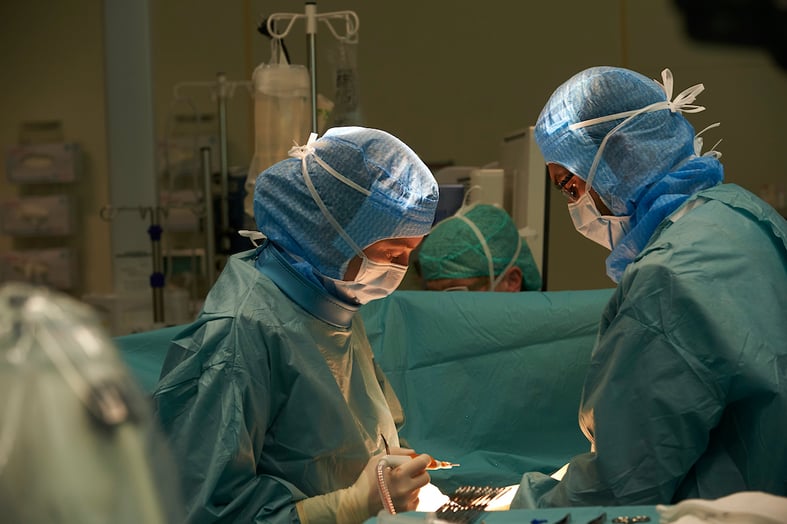Research conducted by Lund University has demonstrated that the right lighting makes a difference for healthcare professionals. In particular, a balanced light during surgeries creates a better working environment. This is why Skåne's new university hospital in Malmö has chosen a highly specialized lighting system from Chromaviso for all of its new operating rooms.
Strained eyes, neck pain, headaches, and fatigue are common challenges faced by surgeons, nurses, and other staff in operating environments. Lund University's Associate Professor Hillevi Hemphälä has been conducting research on lighting in operating rooms since 2013, authoring a PhD on the subject and publishing several scientific papers. Together with Helsingborg hospital, Hillevi Hemphälä has compared different lighting settings for laparoscopic and open surgeries. During laparoscopic surgery, the goal is to create a lighting environment that supports a clear screen image with distinct contrasts and no reflections.
—Our research at Helsingborg Hospital reveals that the staff prefer coloured light during laparoscopic surgery over white light, Hillevi Hemphälä says.

Open surgery presents challenges in terms of lighting
One of the challenges faced during open surgery is the transition from the powerful surgical lamp to the ambient lighting of the room.
— The high luminance ratio in operating rooms creates a contrast glare that strains the eyes and makes it difficult for nurses to see their tools. This can greatly impact their ability to perform their tasks effectively and efficiently, Hillevi Hemphälä explains about the challenges faced by healthcare professionals due to this glare.
To address this challenge, Hillevi Hemphälä and Chromaviso developed a concept that increases the ambient lighting in order to dim the light from the surgical lamp. This solution was subsequently examined in a research project, which demonstrated that it created an optimal and balanced lighting environment.

Light quality makes a difference
Lighting is crucial for creating a positive work environment, and enhancing the well-being and performance of healthcare professionals. However, not all lighting is created equal, as highlighted by Hillevi Hemphälä, an expert in the field. Glare and flickering are two aspects that can cause significant harm. The presence of flickering indicates poor quality in the LED driver that powers the lighting system.
— Temporal light modulation, which can cause both visible and non-visible flickering, poses significant challenges for many individuals. Unfortunately, it is often overlooked because it is not always visible to the naked eye. Achieving flicker-free lighting requires high-quality standards. New standards are currently being developed to make it easier to assess the quality of light, as Hillevi Hemphälä explains.
It is particularly important for the lighting to be flicker-free at all dimming levels, including low illumination levels.

Chosen for the new hospital in Malmö
Based on the research conducted by Hillevi Hemphälä, Chromaviso has further developed the concept for open surgery operations. The upgraded concept, known as Chroma Zona Triple White, has been chosen for the new hospital construction in Malmö, set to be completed in 2023. This innovative lighting solution will be implemented in 19 operating rooms and 4 large hybrid rooms for both open and laparoscopic surgeries. The solution meets the "no effect" standard set by IEEE PAR1789, as well as the limits of PstLM ≤ 1 and SVM ≤ 0.4 for dimming exceeding 5% of the maximum light intensity.
About the solution for open surgery
Chromaviso has developed the groundbreaking concept, Chroma Zona Triple White, based on the extensive research conducted by Hillevi Hemphälä:
- Synchronization of lux levels and colour temperature between the ambient lighting and the surgical lamp
- Optimization of light uniformity in the room - from the operating table/area to the farthest point according to EN12464-1
- High lux levels: 5000-6000 lux on the operating table/work area measuring 3x3 meters
- Dimmable without flickering throughout the entire dimming profile according to IEEE1789-2015, with a value of PstLM ≤ 1 and SVM ≤ 0.4 for dimming >5% of the maximum light intensity
- Luminaires - with powerful and low-glare light - reduce the number of fixtures on the ceiling. This ensures more space for soundproofing to create a good acoustic work environment, as well as increased flexibility for other ceiling-mounted medical-technical equipment.

